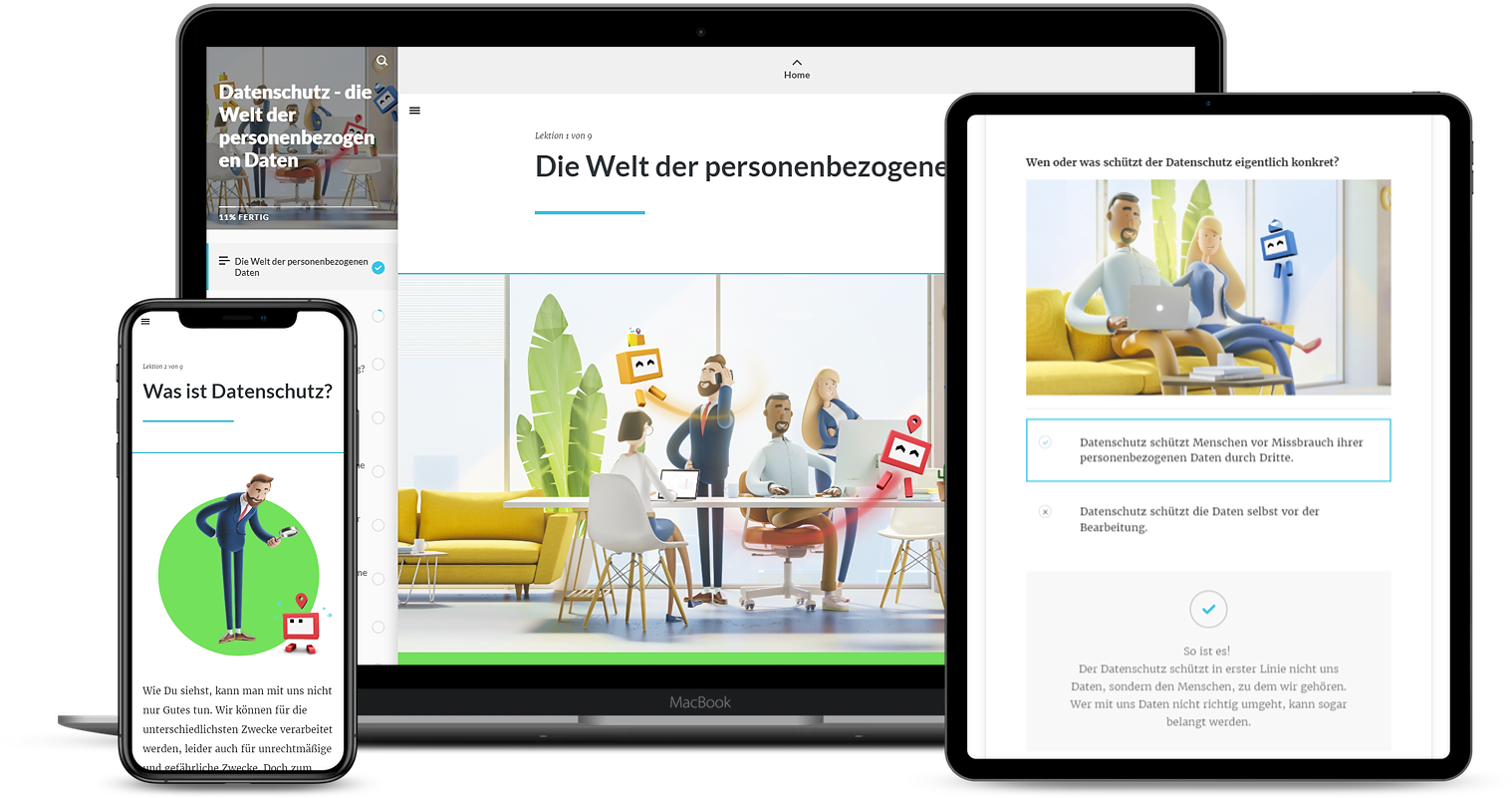
Don’t call it compliance!
5 success factors for effective realisation of
"boring" trainings
Spontaneous yawning, irritated eye-rolling and sudden appearance of urgent appointments are some of the most common side effects of announcing the latest compliance training. Yet, it is crucial that employees internalise the learned content from important training courses on topics such as data protection or fraud prevention for the long term. This can only be achieved if the learning experience is great. We reveal how that can be done.
“It really is very simple: The more complex and dry a topic, the better the experience needs to be for the learner,” Sven R. Becker, learning expert and Member of the imc Executive Board sums up. As much as the learning experience is hyped up and features in the learning management system (LMS), it often falls by the wayside in company-specific training.
Topics like the latest GDPR provisions or IDD training as soon required in the insurance sector might not be met with great enthusiasm – but they are extremely important. Employees not only need to understand these topics, they must also internalise them and apply them in their daily work.
Creative realisation of dry topics like fraud prevention
Audi is leading by example. The automobile giant ventured to try a courageous concept: Web-based training modelled on “Sin City” is leveraged to train all employees in fraud prevention. Right from the outset, it is obvious that this training course is different. Usually, a participant would click “Start training now” to make a start on their training course. Here, they are greeted with the following text: “Welcome to Fraud City. The city “eats” its residents – skin, hair and all. We hope you’re up to it. Enter at your own risk.”
Throughout the course, the participant accompanies Detective Fraudless who investigates fraud cases. In this game setting, the participants become familiar with the criteria used to identify cases of fraud while also becoming sensitive to suspicious behavioural patterns.

Laura Schumacher, Training Officer at Audi, emphasises: “We very deliberately wanted to provide a different kind of training course that is fun and sticks with you, especially for this sensitive topic.”
This unusual concept is paying off: On the intranet, countless Audi employees made largely positive remarks on “Fraud City” – rather remarkable for compliance training.
Standard training for ever-changing guidelines
Since not everyone can justify the time and expense of highly customised training courses, a large selection of off-the-shelf content (OTS) is also available. In particular, this is a suitable solution for contents or certifications requiring adaptation due to regular updates, legislative changes or new guidelines.
Such off-the-shelf training courses fit the bill for product training required in the insurance, banking, pharmaceutical or medical sectors. It is, however, important that providers hold relevant certificates and accreditations and are able to guarantee automated learning content updates.
TIP
Ensure that your provider is an accredited educational service provider and guarantees that content is always up to date.
These standard training courses can easily be mapped in the LMS and facilitate complete documentation and certification of all employees. Vivian Porath is responsible for OTS contents at imc. She is confident that these training courses need not be boring at all:
We have received outstanding feedback from our clients, especially on our standard data protection training. Our clients feel the design hits the spot, being neither too comical nor too serious.
One reviewer stated that they thought the training course achieved a perfect technical balance. Other courses they attended had been either too superficial or looked at the subject in such depth that they had switched off. We were thrilled to hear that. After all, we strive to present the GDPR in such a way that anyone can gain from it. Many employees have no need to dive deep into the subject matter. Rather, they must be sensitised to the topic in general.”

Vivien Porath
It still holds true: Employee motivation and a great learning experience are key. Without them, learned content is forgotten faster than you can close the next cookie banner.

LMS integration
Training alone is not enough – whether based on customised or standard content. Traceability must also be ensured. This is best done with a suitable LMS that allows admins to allocate relevant training courses to each target group, and should also include setting end points and establishing escalation management.
Say, for example, insurance expert Ms Smith belongs to a group of employees who must earn a specific number of IDD points . The administrator can create an automated alert for relevant courses in the system. If she fails to complete the training by a certain date, she will receive repeated email reminders. At a pre-defined date, her direct supervisor can also be informed.
INFO
Since 2018, all insurance intermediaries throughout Europe have been obliged to undergo further training within the framework of the Insurance Distribution Directive (IDD). The number of obligatory training hours varies from country to country.
What to base your choice on
What should clients pay attention to when buying compliance training? Sven R. Becker summarises:
1. First of all, understand your target group. Does the target group need to acquire in-depth specialist knowledge? Or is sensitisation the primary goal? Your answer to this question must be reflected in the technical presentation.
2. It is generally advisable to establish a basic understanding for sensitive topics across the entire organisation, a compliance mindset. Each training course and each measure must be positioned within this mindset. It is crucial that management is setting an example. Integrating senior management into the training course is often helpful, and asking them to design realistic case studies can help learners see how the content applies to them.
3. Standard training is better suited to content more general in nature, as the provider must ensure that it is up to date. However, if a topic is specific to a sector or even just the company, it helps to customise at least parts of the training and only filling the gaps with standard content.
4. Ask yourself for how long you want to use a training course. If contents requires frequent adaptation, OTS content is often a better choice – provided that certifications and updates are guaranteed.
5. Don’t call it compliance training! The term alone is like a red flag for many employees. It pays to be brave and find a different name. Surprise your learners with training courses that polarise and stand out. This makes your contents more memorable than with run-of-the-mill courses. And maybe you can even have your employees enjoy the training – without the yawns.
Further information
If you would like to learn more about off-the-shelf content or our custom content, please check the related pages and feel free to contact us.
You can also check this webinar recording (German only) about the topic of compliance.